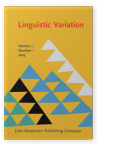Vol. 23:2 (2023) ► pp.343–378
VO or OV
V to v or not to v
This article sketches a new analysis of the diachronic development found in many West Germanic languages from a hybrid VO-OV order to a rigid OV or VO order. The discussion departs from the discussions in Struik & Van Kemenade (2020/2022) and Struik & Schoenmakers (to appear) on the diachronic development of English/Dutch, which focus on the role of object shift and information structure. My interpretation of their data will be based on an earlier analysis of the Germanic OV and VO languages in Broekhuis (2008: § 2.4; 2011). The main conclusions are the following. First, the change from the historical hybrid VO-OV systems to the rigid OV and VO systems of the present-day languages is due to changing the “setting” [±V‑to‑v] to the more categorical ones [−V-to-v] or [+V-to-v]. Second, the role of object shift in the diachronic development is modest; it is not involved in the development of the OV-languages at all and involves only the (partial) loss of object shift in the VO-languages (contra Struik et al.). Third, the encoding of the information-structural new-given distinction remains constant in that the interpretation of (un)scrambled nominal objects does not change over time (contra Struik & Schoenmakers).
Article outline
- 1.Introduction
- 2.Background assumptions of the two competing analyses
- 3.The codification of new/given objects in the history of Germanic
- 3.1The derivation-and-evaluation framework
- 3.2Information structure: Leftward object shift without V-to-v
- 3.3Information structure: Leftward object shift plus V-to-v
- 3.4Conclusion
- 4.The VO-OV alternation in (historical) West Germanic
- 4.1Competing grammars in the D&E framework
- 4.2Degrees of VO/OV-ishness
- 4.3Transition from the hybrid to a rigid VO/OV systems
- 4.4Conclusion
- 5.The placement of new definite objects in OV languages
- Acknowledgments
- Notes
-
References
For any use beyond this license, please contact the publisher at [email protected].
